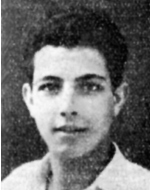Was born on 1 June 1927 in Sanaa, Yemen, and immigrated to Israel with his parents in 1930. In his early years he was weak and when he arrived in Israel, he suffered from severe stomach poisoning until he despaired of his life but recovered. He studied in the elementary school in Holon, and was a lively, dynamic student from childhood, who, unlike most of the students, refused to “toe the line” and often caused trouble for his teachers, but because he was clever and humorous he knew how to dissipate The tension between him and his teacher by a clever and sharp joke, and because of a dispute with his teacher he decided to leave his studies in the middle of the last year of his studies and move on to a working life. He will finish his studies at the beginning of the school year, and Moshe says, “Life will teach me more than the school.” He spent a year studying in Tel Aviv, but the city and Shona were fed up with him and decided to go to the kvutzat kinneret. Moshe devoted himself to the various branches of the agriculture with great enthusiasm and was full of age when he became a tractor driver, and he became calm, restrained and restrained, and discussed various problems with seriousness and understanding. After a year in the youth movement, he volunteered for the Palmach, where he saw the content of his life. After two years in the Palmach, he was forced to return to his parents’ home to help them, and he was accepted as a construction worker in Holon and helped his parents build a house He struggled and pondered and dreamed of returning to the group because he wanted to repair life and help build a stable socialist society, Moshe was a socialist of consciousness, one of the youth leaders of the Ahdut Ha’avoda party “Our mission is not to save them in times of rage and persecution, but rather in an unending kibbutz of postcards that clings to the building of the land.” In the eyes of his friends, especially his own, was a figure “His appearance, his simplicity, his honesty, his sharpness, his rebellions, which did not always end successfully but never let go, and his insistence on his own – charmed his men.” When Moses looked at you, You would have followed him … “- said one of his friends. On the eve of the United Nations General Assembly resolution on the partition of the country, he was deeply upset, but already knew what was expected and told his comrades: “We will go immediately to battle.” He immediately joined the ranks of the defenders and did not rest until he went to the Palmach headquarters to find out for some reason Not yet read. When he heard that in the next few days he would be called to serve, he did not stop there and decided to join the fighters in Holon. Served first in Givati Brigade, one of the first volunteers to carry out operations. With courage and self-sacrifice, he embarked on very difficult missions. Was in the department that kept the JNF House in Beit Dagon, participated in the battle over Tel Arish and in the explosion of the ice factory in Yazur. The attack on Tel-A-Rish revealed extraordinary courage. According to his friends, he jumped on an Arab and split in two. In this battle, one of the fighters fell and Moshe, alone from the entire platoon, got out of the field and carried him along with his weapon and the enemy’s weapon. He returned to his friends and was touched by the blood of his friend and tears in his eyes: “My strength was exhausted, but I could not leave it.” After a while he was called to the Palmach, to the “Ha-Furutzim” regiment, and was Simcha that he was again among his comradesAnd they will probably act more vigorously. ” From his base in Hulda he set out for operations in the area. When he came home he would say to his mother, “Do not worry, it will be good, and I and my fellow men will cleanse our country from intruders.” Two months later Basso was transferred to Kiryat Anavim. Before that he had been given leave and had come to say goodbye to his parents. “See you in our free land!” – wished. “Now I certainly will not be back soon, and they will not give us a vacation.” And he did not. In preparation for the “Nachshon” operation, the Castel, which controls the road and was held by our forces, was conquered. The Arabs carried out a number of counter-attacks in order to return this vital control to their hands and on one night, on the night of April 7-8, their commander Abd al-Qader al-Husseini was killed. On the 28th of Adar II 5708 (1948), the Arab forces carried out a fierce attack to capture the place and find the body of their leader. The Palmach platoon, which belonged to the 5th Battalion of the Harel Brigade, came out as reinforcements for Castel and her men, who hid on the retreating of the defenders of the Kastel, who were buried in a mass grave in Ma’aleh Hahamisha. 1953) was put to rest at the military cemetery on Mount Herzl in Jerusalem.
